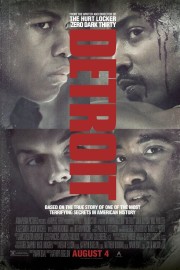Detroit
In a time of Black Lives Matter and the senseless deaths of African Americans like Tamir Rice, Eric Gardner and Travon Martin, Kathryn Bigelow’s “Detroit” feels like an important movie for the time. That social awareness is, no doubt, part of led Bigelow and her collaborator on “The Hurt Locker” and “Zero Dark Thirty,” screenwriter Mark Boal, to make the film, but the fact is, I can see a film like this coming from Bigelow anyway, because in a way, she already made a similar film in her underrated “Strange Days,” which also centered around the brutality of the police against an African-American, albeit with a science-fiction landscape. I wonder if the memory of that film was in her brain when her and Boal were working out their latest film, which is set during the Detroit riots in 1967.
After the painful events in Charlottesville, Virginia this weekend, it felt like Bigelow’s film was an even more important one to watch. “Detroit” focuses its attention on the 1967 Detroit 12 Street Riots, and in particular, an incident at the Algiers Motel wherein three young black men were killed by white Detroit PD officers under questionable circumstances. The film starts with a raid on an unlicensed bar, where the public arrests of the black clientele by white police officers sets off days of looting, riots and fires to local businesses. The relationship between the Detroit PD and the black community is one of distrust and violence, as even daylight hours can bring about violence and an inability to freely move around the city. I mentioned Charlottesville earlier, but memories of Ferguson after the death of Michael Brown also come to mind, especially when it comes to what happens at the Algiers Motel, which is at the center of the film.
Bigelow sets the stage at the top of the film by chronicling, in quick order, the migration of blacks from the South to the North for work, and then whites in the major cities out to the suburbs, and how the disparity in the makeup of police forces with the makeup of the community on the whole led to uneasiness, even at the time of the Civil Rights movement. Riots break out in Watts, Harlem, and other places at the time, but Bigelow focuses in on Detroit, and we get to know several different characters. There’s a black R&B group called The Dramatics, who are hoping for their big break before police shut down the music hall during the riots; there’s Melvin Dismukes, a private security guard at one of the grocery stores, hired to protect it from looting; the Detroit PD, who is arresting residents by the thousands for various crimes during the riots, and are later backed up by Michigan State Police and the National Guard; and finally, there are the residents of Detroit themselves, as well as some of the people who find themselves staying at the Algiers Motel on the evening of July 25, 1967, when shots from a starters pistol, brought out as a joke, appear, to the National Guard and Detroit PD, and Dismukes, who was taking them coffee at the time (and is played by John Boyega), to be from a sniper at the annex behind the Algiers. Detroit PD, the National Guard and Michigan State Police, and later, Dismukes, converge on the scene, with only Detroit PD and the nine residents of the annex remaining to try and get down to the truth of what happened. By the time all of the residents are brought down to the first floor, one of them (Carl Cooper, who did the shooting with the starters pistol, which was never found) was dead, and the police on the scene, led by Philip Krauss (Will Poulter), are trying to get the identity of the shooter, and where the weapon itself is, from the people in the annex. This process includes violence, intimidation tactics such as faking the deaths of another person to get a confession, and even the humiliation of two white women (played by Hannah Murray and Kaitlyn Dever) who were found in the room of a Vietnam vet (Anthony Mackie). At the end of the night, two more black kids (none of the victims were older than 19) were dead, and the rest of the people were sworn to silence about what happened.
Bigelow’s cinematic storytelling, and sense of time and place, are strong in “Detroit,” but you can hardly expect anything less after “The Hurt Locker” and “Zero Dark Thirty,” and she stages the events of the riots with the authenticity and immediacy of a documentarian on the ground 50 years ago. I think the biggest thing keeping “Detroit” from being elevated to the same level as her last two films, however, is how the film doesn’t really have as strong of a personal and emotional pull. Despite the powder keg events it depicts, “Detroit” feels distant due to the lack of an emotional center. “Hurt Locker” had the bomb disposers and the PTSD they felt from their jobs, while “Zero Dark Thirty” had Jessica Chastain’s determined CIA investigator. There are a handful of main characters in this film- Dismukes, Krauss, Fred Temple (Jacob Latimore), who will be killed at the Algiers, and Larry Reed (Algee Smith), the lead singer of The Dramatics who, along with his buddy Fred, hid out during the riots at the Algiers, and had their lives changed forever by doing so- and all of them are performed very well. This film isn’t about a central character, however, but an event, the aftermath of which echoes throughout history and into the present day. The parallels of what happened at the Algiers, and in its aftermath, with any of the recent shootings and deaths at the hands of the police are unmistakable, and that is, ultimately, what makes it such a vital piece of filmmaking.










